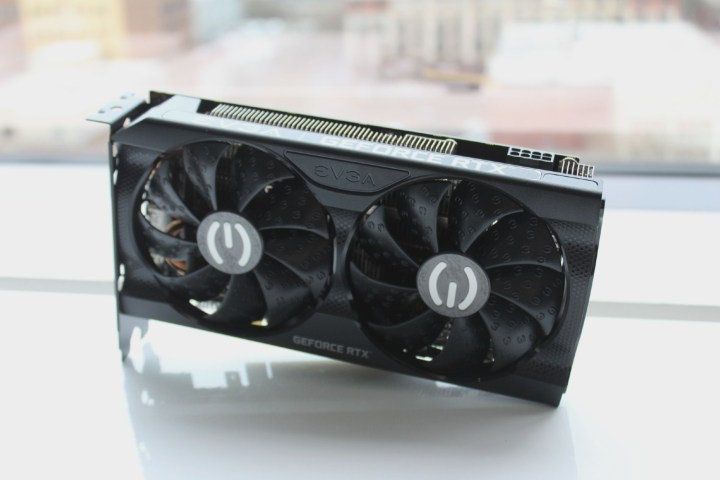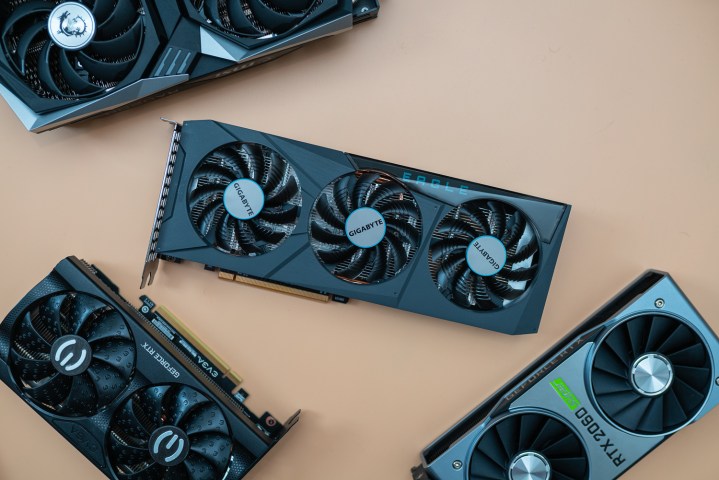With availability for GPUs reaching pre-shortage level, prices for graphics cards continue to normalize as well.
One board that was subjected to considerable price increases over the past two years, Nvidia’s RTX 3060, can now be bought for a cost that’s slightly above its manufacturer’s suggested retail price (MSRP).

As spotted by Tom’s Hardware, EVGA, one of Team Green’s board partners, has listed the GeForce RTX 3060 XC Black Gaming model for $370. That price point is actually below the MSRP for this individual model — EVGA has offered a $30 instant rebate for those who buy this specific version.
However, orders are capped to a limit of two per household, which could simply be a deterrent for scalpers. After all, this particular GPU sports 12GB of GDDR6 memory, so it’s been a popular target for individuals looking to sell it for a profit on third-party marketplaces.
Comparatively, the original MSRP that Nvidia attached to the GeForce RTX 3060 is $329.
Resellers and other online retailers, meanwhile, are still listing certain GeForce RTX 3060 variants for about $500 or higher, according to Tom’s Hardware. The cheapest can be found for around $470 on eBay.
This is not the first price cut EVGA has applied to an Nvidia graphics card. The company said it has restocked its Nvidia RTX 3080 models. Alongside increasing the stock for such products, it also made them available for close to their list price.
With the GPU shortage more or less over, potential consumers are seeing aggressive price drops across the board in major markets, including the U.S. and U.K. Inflated price points for many popular graphics cards, which has been the case since 2020, is no longer the norm.
Nvidia itself recently announced its Restocked and Reloaded campaign, confirming that it has increased the stock for its RTX 30-series GPUs.

Why are prices reaching MSRP now?
So what’s the reason behind GPUs approaching or even falling below their original list prices? It goes without saying that Nvidia, AMD, and all the board partners for these two companies generated an unprecedented amount of revenue and profits due to the shortage and subsequent demand. Case in point: Asus reportedly gave out massive bonuses due to the amount of revenue it was making from GPUs.
At one point, the average price for a GPU was even above $1,000.
If consumers were still paying above-market costs for boards en masse, it’s a foregone conclusion we wouldn’t be seeing prices decreasing this fast.
However, one important factor to consider is that next-gen GPUs are set to launch during the second half of 2022. As such, many will opt to wait a few more months before upgrading their system or building a new PC with a current-gen card.
The aforementioned state of affairs has most likely led to a backlog accumulating for GPU manufacturers, retailers, resellers, and the like. Pent-up demand is unlikely to be alleviated now that next-gen cards are around the corner.
Furthermore, the RDNA 2-powered AMD Radeon RX 6900XT retails for $999, while its RDNA 3 follow-up is said to feature similar performance levels for an MSRP between $399 and $499. If you’re going to get GPUs like these before 2023 arrives, the decision to wait a few months is a no-brainer.
At the same time, it places retailers and Nvidia/AMD board partners in a predicament.
They need to get rid of the stock before their value diminishes even further once their more powerful and efficient successors hit the market. But with a lack of demand, shifting products could prove to be a difficult task — unless, of course, these GPUs (that were almost impossible to purchase last year for a decent price) are made available for a cost that is just too attractive to pass up.
Ultimately, as we move closer to the launch of next-gen GPUs and prices for current-gen video cards plummet even further, don’t be surprised if the industry reaches a stage where below-MSRP boards become the new norm, at least for the immediate future.
In any case, it’s probably in your best interest if you hold out a little while longer before grabbing a new GPU.
Editors' Recommendations
- Don’t buy the RTX 3060 in 2024
- You shouldn’t buy these Nvidia GPUs right now
- Using an RTX 3060? Here’s the GPU to upgrade to next
- CableMod’s adapters damaged up to $74K worth of Nvidia GPUs
- The Nvidia RTX 4080 Super just trounced AMD




